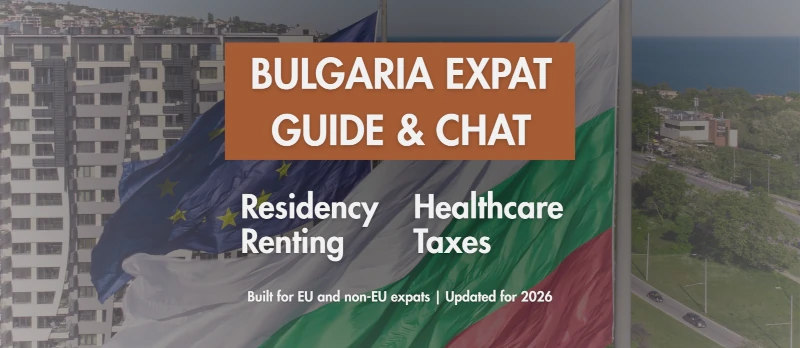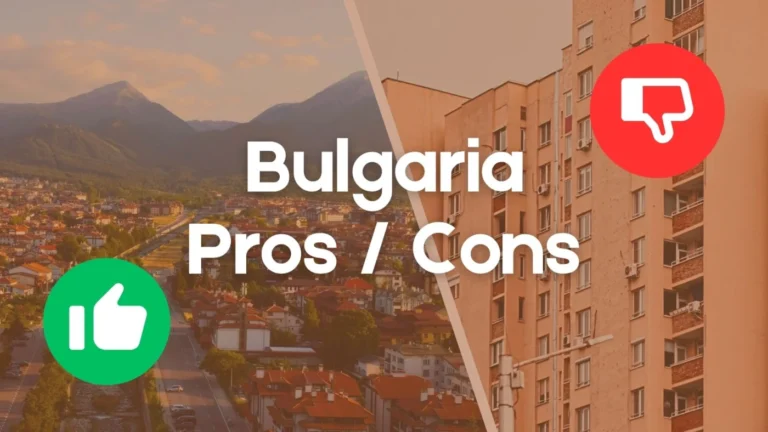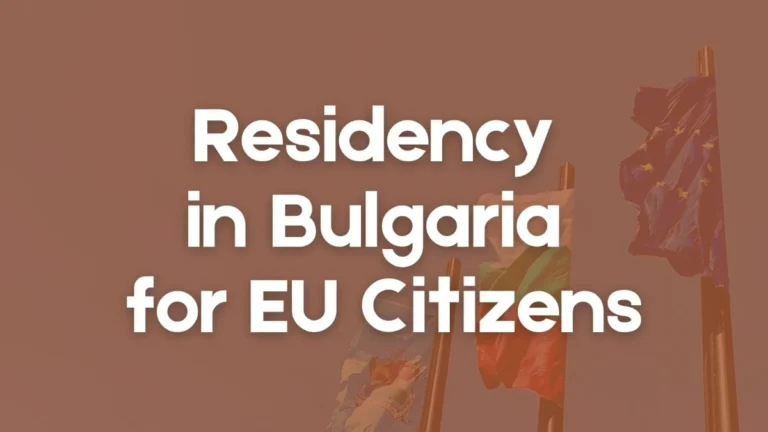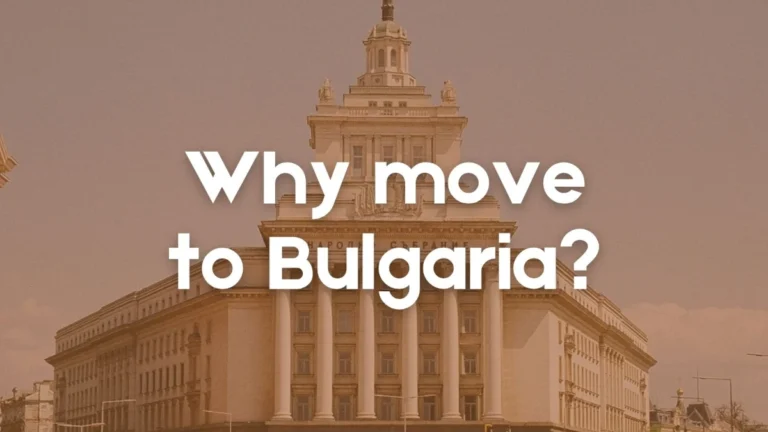Bulgaria is a hidden gem for Non-EU retirees seeking affordability, safety, and a stable EU base.
It might not be the first country you think of when planning your retirement — but maybe it should be.
If you’re a non-EU citizen dreaming of a peaceful, affordable life in Europe, where the Mediterranean isn’t far, your pension goes further, and residency is still within reach — Bulgaria offers one of the most underrated retirement options in 2026.
* For EU retirees: you can move to Bulgaria as a EU citizen even easier with less documentation needed. Check out my free checklist for details.
Looking for how to relocate to Bulgaria? I’ve helped other expats through this process.
→ Download my FREE Bulgarian Residency Checklist (includes documents needed for EU and non-EU citizens)
→ Get the Bulgaria Relocation Guide + Expat Q&A Chat (Lifetime Access)
→ Or let me help you with an all-in relocation assistance (Residence Permit, Housing, Medical and an ongoing support )
I’ve personally helped retirees from the U.S., Canada, UK relocate abroad — and after watching people struggle through unclear government websites or overpriced legal services, I decided to create this guide to give you clarity and confidence.
Let’s break down how to retire in Bulgaria as a non-EU retiree and what life in Bulgaria really looks like.
Why Retire in Bulgaria as a non-EU retiree?
Thinking about how to relocate to Bulgaria as a non-EU retiree? Here’s why this small EU country deserves a closer look.
Here’s what makes Bulgaria stand out:
- Low cost of living: Rent, food, and healthcare cost far less than in Western Europe.
- Residency is possible: There’s a retirement visa route designed for non-EU retirees.
- Safe, stable, and scenic: Whether you prefer quiet countryside or a walkable seaside town, you have options.
- EU access: Bulgaria is a full EU and Schengen member as of 2026, which means you benefit from stable infrastructure, long-term residency rights, and border-free travel across most of Europe.
- Good private healthcare: Affordable clinics, short waiting times, and English-speaking doctors are common in major cities.
Read more: Living in Bulgaria as an Expat: Honest Pros and Cons After One Year in Sofia
Visa and Residency in Bulgaria for Non-EU retirees: How It Works
Here’s a simple overview of how to relocate to Bulgaria as a non-EU retiree, starting with the retirement visa and moving toward long-term residence.
To retire in Bulgaria long-term, you’ll typically go through two main steps:
Step 1: Apply for a Visa D in a country where you are currently a resident
This is a long-stay visa issued by a Bulgarian consulate outside the country.
Here’s what you’ll usually need:
- Proof of retirement income or pension
- Valid international health insurance
- Clean criminal record certificate
- Proof of accommodation in Bulgaria
- A notarized declaration that you have sufficient funds to live without employment
→ Visa D is usually issued for 6 months, during which you must enter Bulgaria and apply for residency.

Stuck in research mode?
Where to live?
Which documents do you need?
Do you register as a freelancer or as a company?
How to pay taxes?
Is Bulgaria even the right choice for you?
I’ve been there.
That’s why I created this Chat & Guide — so you don’t have to spend weeks in research mode, guessing your way through bureaucracy, or worrying about mistakes that could cost you time and money.
Step 2: Apply for Long-Term Residence
Once in Bulgaria on a Visa D, you’ll apply for a residence permit (often 1 year at first, renewable annually).
You’ll need to:
- Visit the Migration Directorate in person
- Present your documents again (in Bulgarian, and in official format)
- Show proof of housing (rental contract or ownership)
- Register your address with the municipality
Important: Everything needs to be correctly translated, notarized, and presented in the required format — and English isn’t always spoken at the migration office. Many retirees hire a local assistant or go through a relocation service to help.
I’ve worked with clients at this exact stage — where small mistakes can lead to delays, repeat visits, or even having to start over.
Cost of Living in Bulgaria as Residents for non-EU Retirees
How much does it really cost to live in Bulgaria as a non-EU retiree? Let’s break down what your monthly budget might look like.
Bulgaria remains one of the most affordable countries in the EU. Here’s what to expect in 2026:
| Expense | Monthly Estimate (EUR) |
|---|---|
| Rent (1BR apartment, furnished) | €400–600 (Sofia), €300–500 (smaller cities) |
| Utilities & Internet | €100–150 |
| Groceries & Dining | €250–350 |
| Health Insurance | €30–70 (basic private plan) |
| Public Transport | €25–30 |
| Entertainment & Extras | €100+ |
| Total | €900–1,200/month |
You can live comfortably on €1,200/month in Sofia or even less in places like Veliko Tarnovo, Burgas, or Plovdiv. Buying property is also an option (with a legal structure) — and some retirees settle in villages or spa towns for a quieter lifestyle and even lower costs.
Read More: Cost of Living in Bulgaria in 2026 after EURO Switch
Taxation of Foreign Pensions in Bulgaria
For most retirees, foreign pension income is not taxed in Bulgaria due to bilateral tax treaties. Bulgaria has agreements with countries like the U.S., Canada, and many EU states to prevent double taxation.
This means your pension will typically be taxed only in the country where it originates — not again in Bulgaria. Always double-check based on your country of residence and consult a tax advisor for your specific case.
Healthcare in Bulgaria: What non-EU Retirees Should Know
Access to affordable, quality care is key when you relocate to Bulgaria as a retiree — here’s what you should know about the system.
For Non-EU retirees Bulgaria can offer:
- Private clinics in major cities with English-speaking doctors
- Fast access to specialists (no GP referral needed)
- Affordable out-of-pocket prices:
- €50–80 for a doctor visit (often includes a scan done at the doctors office)
- €50–100 for tests or imaging
- €400–600 for an MRI (without insurance)
Basic emergency insurance is required for residency, but you can also add private coverage for chronic conditions or comfort.

Best places to live in Bulgaria as a non-EU retiree
Choosing where to live is one of the biggest steps when you retire in Bulgaria. From seaside towns to the capital, here are the top options.
Popular places in Bulgaria for retirees include:
- Sofia – Capital city with clinics, malls, and direct flights
- Plovdiv – expat-friendly town with affordable cost of living, “cultural capital” of Bulgaria
- Veliko Tarnovo – Historic town with an expat-friendly pace
- Bansko – Mountain air, ski slopes, and surprisingly strong infrastructure
- Burgas & Varna – Black Sea cities with beaches and milder winters
- Village life – If you’re looking for land, gardens, and simplicity (note: some villages lack central sewage and may feel isolated)
Need help choosing? I offer a 1-1 call to help you compare cities and find a neighborhood that matches your lifestyle, climate preferences, and budget.
Common Mistakes to Avoid when moving to Bulgaria as a non-EU retiree
Relocating to Bulgaria as a non-EU retiree isn’t difficult — but a few common mistakes can slow you down. Avoid these pitfalls with the right preparation.
- Applying with the wrong documents (or missing a translation)
- Renting accommodation that doesn’t meet legal requirements
- Assuming English is widely spoken at migration offices
- Not budgeting for repeat visits, notarization, or translation services
You don’t need a lawyer charging thousands — but you do need someone who knows the process. That’s exactly why I created my relocation support service and free checklist.
Retirement in Bulgaria Is Possible — But You Don’t Have to Do It Alone
If retirement in Bulgaria is your dream, I can help you make it come true without the stress of going through paperwork alone.
If you’re looking for:
- A stable life in Europe on a modest retirement income
- A slower pace of life with low day-to-day expenses
- Easy access to nature, healthcare, and EU-level infrastructure
Then Bulgaria might just surprise you — in the best way.
Looking for how to retire to Bulgaria as a non-EU retiree? I’ve helped other retirees and remote workers through this process.
→ Download my FREE Bulgarian Residency Checklist (includes a retirement-specific instructions)
→ Get the Bulgaria Relocation Guide + Expat Q&A Chat (Lifetime Access)
→ Or let me help you with getting a residence permit in Bulgaria
You don’t have to figure this out alone.
FAQ: Retiring in Bulgaria as a Non-EU Citizen
1. Can I retire in Bulgaria as a non-EU citizen?
Yes, Bulgaria offers a clear visa and residency path specifically for retirees from outside the EU. You’ll start with a Visa D and apply for long-term residence once in the country.
2. How much monthly income do I need to retire in Bulgaria?
You’ll need to show you have sufficient means to support yourself. This typically means a pension or retirement income just above the Bulgarian minimum wage — around €600–800/month is a safe starting point.
3. Are foreign pensions taxed in Bulgaria?
In most cases, no. Bulgaria has tax treaties with many countries, so your pension is usually taxed only in your home country, not again in Bulgaria.
4. Is health insurance required to retire in Bulgaria?
Yes. You must have valid international health insurance to apply for a visa, and private plans are widely available. Emergency coverage is the minimum requirement.
5. Can I buy property in Bulgaria as a retiree?
Yes, but with conditions. Non-EU citizens can purchase apartments freely. Buying land or houses with land may require setting up a company.
6. How long does the retirement residency process take?
Visa D approval takes several weeks, and the residence permit application takes 1–2 months once in Bulgaria. Delays can happen if documents are missing or incorrectly formatted.

Stuck in research mode?
Where to live?
Which documents do you need?
Do you register as a freelancer or as a company?
How to pay taxes?
Is Bulgaria even the right choice for you?
I’ve been there.
That’s why I created this Chat & Guide — so you don’t have to spend weeks in research mode, guessing your way through bureaucracy, or worrying about mistakes that could cost you time and money.







